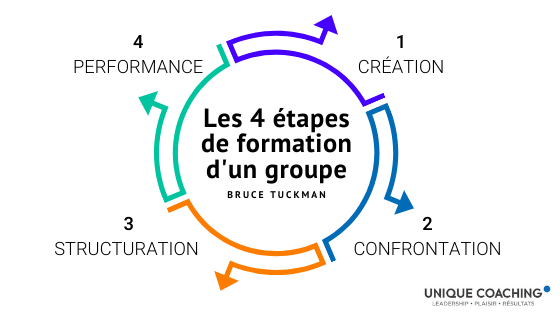Have you ever turned over a new member of your team because he or she didn’t know your organization well enough to have relevant ideas? But how do you deal with new ideas? Even more so when they come from someone new to your organization or when the time is not right for new ideas…
In this article, you’ll find out what to do to manage new ideas in two situations:
- Ideas from someone new to your team
- Ideas… at the wrong time.
Do you prefer video to text? Watch the video recap of the article below.
Case #1: You receive new ideas from someone new to your team
First, remember the first few moments at your current job. How did you feel? Motivated? Can’t wait to share your perspective? Can’t wait to learn new things? Want to meet your new colleagues, boss, team? Want to show and put to good use the expertise for which you have been hired?
Tell yourself that every time someone comes to your team, they may feel the way you felt, or the way I described above.
Tuckman’s model of group formation is a great example of what happens when someone joins the team.
- Creation: the group meets, gets to know each other, we observe courtesies.
- Confrontation: now people are comfortable enough to bring their ideas, to be more direct.
- Structuring: the group is getting organized, reviewing roles, responsibilities, processes.
- Performance: the group sees its performance increase because relationships are deeper, conflicts and structuring have taken place and a team’s own way of doing things is in place.
See the Tuckman Model Wheel on the stages of forming a group below:

And what does this have to do with new ideas?
Well, every time a new person arrives on your team, your team takes a turn again. 😱
If the composition of your team changes often, it can be exhausting for the people in place, and for the manager… and make it look like you’re going around in circles… Isn’t it?
If you’re not sure… Imagine a team that has been in place for 4 years. They are efficient because they have no latent conflicts (they have confronted and structured each other).
And then you hire another person, and a few months later another, then another. What will happen? Clans? A review of processes every 3 months?
Here’s what to do:
1. Understand that groups are not really immune to this process.
2. Accept that new people confront ways of doing things.
3.Organize the following activities:
First, take care of the group creation step .
- Create opportunities for meetings so that the team’s trust is established in order to facilitate the confrontation stage that is coming!
- Establish clear expectations and roles at this point.
- Agree on the common goal.
In other words : to each new employee or colleague, do a small meeting activity, take the opportunity to remind them of the common goal, introduce the people and their roles to all their stakeholders.
Then, be proactive in the confrontation stage of the group.
This step is the most important! If you overlook, you also overlook the future performance of your team. You risk losing people, your new ones among others…
- To allow everyone to express their ideas in a safe environment.
- Clarify the areas of power and control of each person.
- Staying open, an external eye is always good!
In other words : generate the moments where the new person will be able to express themselves, whether in a meeting with you, or at the start of a project. It’s normal for a person to have ideas. Listen.
Avoid saying: you will give me your ideas later when you know the case better.
Instead, do active listening and training on the files.
Even better: integrate improvement feedback and new ideas into your onboarding process.
Listening to an idea doesn’t mean doing it right away.
Next, take care of the structuring/normalization/organization stage.
- Measurethe performance of these structures or standards using indicators.
- To keep the common goal in sight.
Finally, do this in the performance stage of the group.
- Recognize performance.
- Keep focus on achieving goals.
Another problem?
“Yes but… The person’s ideas don’t really meet the business need and I keep explaining the need to them. What to do?”
My question for you: How well do you have the right person in the right position? In other words, a perfect match between skills (or potential) and your business needs?
If you have more potential than proven skills, your support, training and coaching by peers or externally can help. Be honest in performance reviews and provide a development plan.
Here are some articles that can help: giving fair and caring performance feedback and how much time to spend coaching a person.
Case #2: You don’t know how to handle new ideas that come at the wrong time
In this case, it can be a new person on your team or not. Simply, the suggested ideas don’t come at the right time: at the end of a deadline, in a rush period, when decisions are made, when you’re overloaded and can’t take any more changes.
In order to manage new ideas, it is best to:
- Take a deep breath in order to think and act with a minimum of distance.
- Question the timing: Is it really a bad time? And if so, why? (It may happen that you are simply the one who is tired of the changes, put things in perspective and return to the common goal and business need.)
- Respond to the person by respecting the following points:
- Recognize his contribution (Thank you for your idea.)
- Inform about the context. (We are in the execution phase of the project, we finished the analysis phase two weeks ago… at this point, a change would have the following impacts…)
- Give feedback. (This idea would have worked for such and such a reason… This idea would not have worked because… This idea could have worked if…)
- Discuss an improvement. (How could this discussion be had at a better time in the project next time so that other options could be considered?)
Another problem…
The same person always comes up with good ideas, but always at the wrong time and it gets frustrating on both sides…
My question: Did you talk about it? That is, did you ask the person why they always name their ideas along the way or after decisions are made?
And… perhaps, that this person should be invited at the beginning of the project, or more clearly informed of the deadlines… See what you could put in place by mutual agreement so that you can benefit from his ideas, but without starting all over again!
Conclusion
To make it easier to manage new ideas, first put into perspective that there is a standard process, in all groups, that exists. The more you take this into account and be proactive, the more positively you can handle new ideas.
Warning: If you have hired competent people and are not listening to them, please stop it and take the time in your onboarding process to take their point of view into account.
Take the time to get to know yourself. If you wish, Unique coaching offers two perfect team activities for this: team coaching with Nova to better collaborate and an immersion game with behavioral agility to refocus on the common goal.
Then, if you’ve read between the lines, the more you bring the right people at the right time into the process, the less likely you are to miss ideas or cause frustration.

